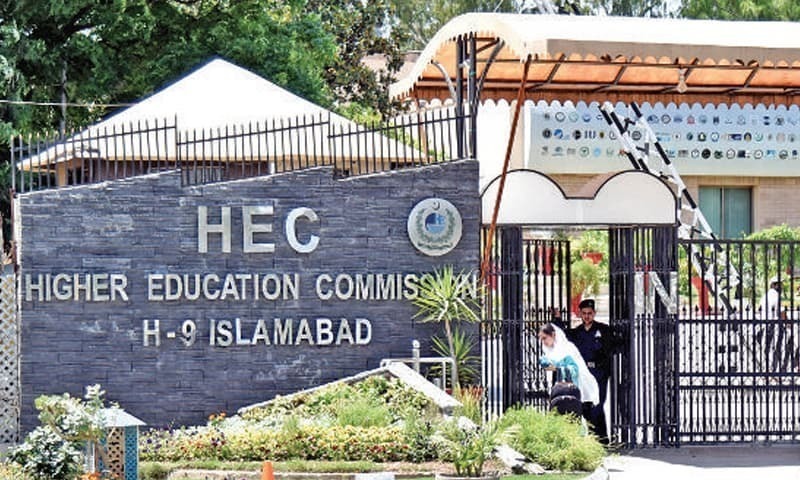Dr Lubna Zaheer
The Higher Education Commission (HEC) of Pakistan has once again become the subject of news and reviews and sadly, no positive news is there. There are reports that the federal government is planning to limit the powers of the Commission. In this regard, some amendments have been proposed in the HEC Ordinance. The reports are very worrying for the public and private education sector as the federal and provincial commissions have showed concerns. It’s surprising the government is tight-lipped on this ‘crucial’ matter. The government’s reaction is still awaited a silence is adding to the anxiety.
A few days ago, the head of the Association of Private Sector Universities of Pakistan (APSUP), Professor Dr Abdul Rahman sent a letter to Prime Minister Shehbaz Sharif. In this letter, he informed the premier about a great deal of anxiety among university heads and staff regarding the proposed amendment to the HEC Act. The PM has been requested that n law should be passed without consulting the stakeholders.
In the current scenario, the demand for consultation with relevant stakeholders is justified. Generally the decisions that are taken after extensive consultation deliver much positive results. There are several examples in the recent past. In 2015, a code of conduct for electronic media was formulated during the PML-N regime. The government’s committee headed by PM’s Adviser Irfan Siddiqui had ensured consultation with the relevant stakeholders. This code of conduct was formulated with a consensus. It came into force on the direction of the Supreme Court of Pakistan. The example of the National Action Plan is also in front of us. This action plan was also formed with consensus. It is incomprehensible why the federal government is reluctant to consult with the relevant stakeholders regarding the proposed amendment. The proposed amendment is mired in controversy due to lack of consultation.
The draft amendment proposed by the government has gone through my eyes.
In my opinion, some of the proposals prepared by the government regarding the change in the law of the commission seem to be justified. For example, the government wants the financial affairs of the commission to be subject to the rules and regulations laid down by the Auditor General of Pakistan (AGP). Similarly, the government has suggested that rules should be framed for the appointment of officers, advisors, consultants or employees in the Commission. The rules should be approved by the concerned ministry or division. In hindsight, there is no problem in the implementation of these points. However, there are some suggested points, which seem to limit or nullify the powers of the Commission. For example, after the proposed amendment, the status of HEC Chairman will be equal to that of a civil servant, instead of a federal minister. The question is why does the government want to withdraw the status of the federal minister from the head of the Commission?

Like the previous government, the incumbent government also has an army of ministers. The number of federal cabinet members is more than 70 and there are many special assistants who don’t even have a portfolio. This is more or less the situation in every government. In such a case if the HEC Chairman has the status and powers of a federal minister, so what is wrong with it? The Commission’s chief is a very important responsibility. A person capable of holding this important position must be powerful.
The importance and authority of the HEC can be gauged from the fact that this body works directly under the Prime Minister. After the Prime Minister, the Chairman of the Commission holds all the powers. After the proposed amendment, the Prime Minister of Pakistan will be able to delegate the authority to look after the affairs of the HEC to the education minister. That is, if the amendment is approved, the powers that are entrusted to the chairman of the commission will go to the education minister. The Chairman of the Commission, who is now directly responsible to the Prime Minister, will be answerable to the Minister of Education and the Ministry of Education. It is feared that this will enhance the possibility of interference in the affairs of the Commission.
After the amendment, the HEC will get the status of the single higher education regulatory body in the country. Educationists believe that in this way the powers of important institutions like provincial Higher Education Commissions, the Pakistan Medical Commission, the Pakistan Engineering Council, and the Pakistan Bar Council will be lost. And the law of the Commission will conflict with many other laws. Similarly, it is proposed to reduce the number of members of the Commission from 10 to six. The Secretary of Information Technology, Scientific and Technological Research Division is also a member of the Commission. Now it has been proposed that this secretary will not be a member of the Commission. There are also four representatives of the provincial governments in the Commission. It has been proposed to remove them.
Undoubtedly, the government has the power to reduce the number of Commission members. But under the guise of this shortfall, if all four provinces are deprived of representation, this cannot be supported. The Executive Director is a very important post in the Commission. The authority to appoint him rests with the Commission. It is proposed that the power to appoint the Executive Director will be vested in the government instead of the Commission. This matter is also equivalent to removing the authority of the commission.
Our political governments have to make political decisions even if they don’t want to. It is feared that after this amendment, the appointment to the post of executive director will be made on political grounds. Under the current law, the tenure of the Commission’s chairman is protected. It has now been proposed that the chairman can be removed from the job at any time on the basis of poor performance and misconduct. After the proposed amendment, the representation of the private education sector in the Commission will also be affected.
Cut the long story short, there are some points in the proposed amendment that require conciliatory consultation. It is necessary for the government to ensure consultation with the relevant stakeholders in this matter. There is possibility that the government wants to improve the affairs of the Commission through the proposed amendment.
Even if this is the case, it doesn’t seem right to exclude the relevant stakeholders (i.e. university owners, heads, teachers, students, etc.) from the consultation process as undesirable elements. A very important institution like the Parliament also organizes consultation in the legislative process, so as to avoid conflicts. When a bill goes to the Standing Committees, most of the relevant stakeholders are invited and their views are heard. There should also be consultation in the matter of amending the Higher Education Commission Ordinance.
It would be better if the government take university owners, principals, academics and other stakeholders into confidence and listen to their views. Doing so will create a very good and positive image of the government. If the government doesn’t ensure the consultation process, then there may be bitterness in the government’s relations with the federal and provincial commissions and universities, the consequences of which will have to be borne by the education sector.

— The author is an academician and political analyst
Disclaimer: The views expressed in this article are those of the author and do not necessarily reflect the official policy or position of Lahore Mirror

